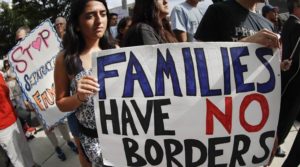
Flora came to the United States from Central America when she was 25 years old. Left behind were her mother, three sisters and a younger brother, as well as a father who abused the children.
Whenever he decided that any of them needed to be punished, he would make them kneel on dried beans and corn kernels for up to two hours, until their knees were pockmarked with deep, angry red indentations. The irony of his choice, their “daily bread,” wasn’t lost on Flora.
When she arrived in the States, Flora didn’t speak English. She got a job with a family in Pennsylvania, cooking and keeping house for a few years. That’s when my father, who was involved with a conservation initiative in her country and who spoke Spanish, met Flora through a mutual friend. Dad was a widower in his seventies, living alone. Flora came to live in, keep house, cook dinner and make his peanut butter and bacon sandwiches to take on the train to work every day.
Before long, their relationship shifted from employer and employee to become more like father-daughter. Although I lived far away, I thought of Flora as part of our family, almost like a sister I never had. When Dad needed a hip replacement (so he could continue playing tennis in his eighties!), it was Flora who nursed him through his rehabilitation.
Flora eventually married and moved into her new home. Yet she continued to come in every day to clean, do Dad’s laundry and join him for the first course (soup or salad) every evening before going home to cook for her husband and herself. And she continued to make his peanut butter and bacon sandwiches before she left for the night.
I never really learned if Flora was an illegal immigrant. What I do know is that my father put money aside for her retirement and that, perhaps 15 to 20 years after she had come to the States, she went into Independence Hall in Philadelphia on the Fourth of July, raised her right hand and took the oath that made her a United States citizen.
Eventually Flora, with Dad’s help, was able to bring two of h er sisters and her younger brother to the States. Dad provided young John with a scholarship to the University of Delaware. After he graduated, he worked as a community organizer in a Latino neighborhood. Maria trained as a massage therapist, while another sister found work as a housekeeper and was able to send her son to school. Eventually, they all became American citizens.
er sisters and her younger brother to the States. Dad provided young John with a scholarship to the University of Delaware. After he graduated, he worked as a community organizer in a Latino neighborhood. Maria trained as a massage therapist, while another sister found work as a housekeeper and was able to send her son to school. Eventually, they all became American citizens.
Dad took the train to work into his early nineties. (We think it was the peanut butter and bacon sandwiches that did it!) But when it became clear that he was failing and could no longer go into town, Flora, although still married, came back to live in and care for him. She was the primary caretaker which hospice required for Dad to stay at home. She was with him when he died.
Why is this story important? Clearly, it’s important for my family. It’s important as well, at this moment in our political life, because I believe there are thousands of “Floras”, “Johns” and “Marias” in our country who are actually angels in ordinary clothing, spreading love, justice and healing. It’s such an old story: how our country was built on the hard work and talent of immigrants. Yet too often the story gets muddled into a theme about how we (read “privileged white people who are already here”), through our benevolence, offer “those people” a better life.
Based on my limited experience, I submit that it is the other way around. Flora came and brought with her compassion, kindness, strength and, above all, a love which changed the course of our family’s life. If that’s not grace, I don’t know what is.

Such a lovely story, Polly. I knew some of it but not all of it. How timely.
Pat
This kind of story needs to be on the front pages of our newspapers and periodicals, to remind us of where we’ve come from and where we are going… toward more love, understanding, and inclusiveness. Thanks Polly💙
Dear Friend: I can’t tell you enough how much these “Polly’s Papers” have meant to me. You are an amazing writer who has such an insight into human souls. Thank you so much and I will leave with a big “AMEN” to this story of your father and Flora.
Beautifully written Polly, truth from your soul. I too have heard you talk about Flora in your father’s life and yours. A treasure. Brings tears to my eyes and a yearning in my heart to care for our precious, contributing immigrants. We have a long way to go. AMEN as well. Thank you Polly
Dear Polly,
I can add only ‘amen’ to the amens, on a day when the immigration situation looks a just a little bit brighter.
Polly, this is a great story and a reminder of how many of us would not be here if not for love and compassion of “those who came before”.
Your dad was a great role model as was Flora. It is ironic that her name is Flower as well.
Thanks for your inspiration.
Thank you Polly. We, who so frequently see ourselves as “saviors of those less fortunate”, are quite often looking into the eyes of God. We should bow down in thanksgiving.
I give thanks for all of you who have taken the time to write about “Flora”. Your comments have touched me and remind me of how we are all connected in our longing for justice and compassion.
This story brings tears of thanks to my eyes and makes me think of all the kind aids from many counties that took care of my husband in the nursing home and at the VA hospital. I’ve met so many since, taking care of old friends and their spouse’s keeping them at home. We are blessed with their presence at Sunday fellowship and every Sunday at church… what better message of Jesus’s teachings.
A beautiful story of compassion, caring and love. Thank you for sharing it with us.
Thanks you for sharing. I read this as Orlie, the women from Brazil, who has cleaned for me for more than 20 years. I’m not sure how I would have managed when the four children were home plus my elderly mother-in-law and countless guests. How fortunate your father and Flora both were to support each other!
Thanks you for sharing. I read this as Orlie, the women from Brazil, who has cleaned for me for more than 20 years. I’m not sure how I would have managed when the four children were home plus my elderly mother-in-law and countless guests. How fortunate your father and Flora both were to support each other!
Comments are closed.